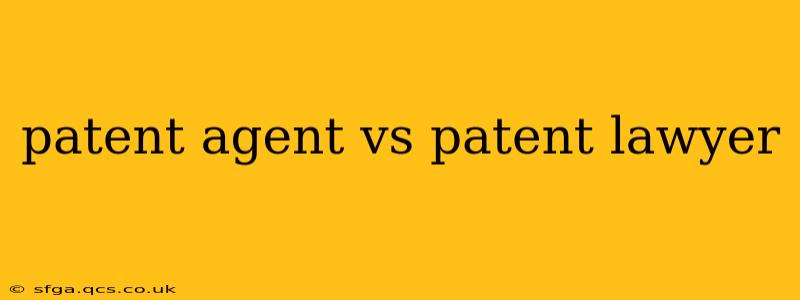Choosing the right legal representation for your patent application is crucial. Both patent agents and patent lawyers can help you navigate the complex world of patents, but they have distinct qualifications and limitations. Understanding the key differences between them will empower you to make the best decision for your intellectual property needs. This article will delve into the specifics, answering common questions and clarifying the nuances of each profession.
What is a Patent Agent?
A patent agent is a registered professional with the United States Patent and Trademark Office (USPTO) who is authorized to prepare and prosecute patent applications. Their expertise lies specifically in the technical aspects of patent law. To become a registered patent agent, one must pass a rigorous examination administered by the USPTO, demonstrating a comprehensive understanding of patent law and procedure. They don't necessarily need a law degree. Many patent agents have advanced scientific or engineering degrees, making them uniquely equipped to understand complex technological inventions.
What is a Patent Lawyer?
A patent lawyer is an attorney who has a law degree (Juris Doctor or J.D.), has passed the bar examination in at least one state, and has also registered with the USPTO. This means they possess both a legal education and the specialized knowledge of patent law required for representation before the USPTO. Patent lawyers can handle a wider range of legal issues beyond patent prosecution, including litigation, licensing, and intellectual property portfolio management.
What are the Key Differences Between a Patent Agent and a Patent Lawyer?
The most significant difference lies in their educational background and scope of practice. While both can prepare and prosecute patent applications, patent lawyers possess a broader legal skill set.
-
Education: Patent agents typically have a science or engineering background and pass the USPTO registration exam, while patent lawyers hold a law degree and pass the bar exam, in addition to the USPTO registration.
-
Scope of Practice: Patent lawyers can offer a wider range of legal services, including litigation, contract negotiation (licensing agreements), and strategic intellectual property counseling, whereas patent agents primarily focus on patent prosecution.
-
Cost: Generally, patent agents may have lower hourly rates than patent lawyers due to different educational and overhead costs. However, this can vary significantly based on experience and specialization.
-
Court Representation: Only patent lawyers can represent you in court. Patent agents are limited to representing clients before the USPTO.
Can a Patent Agent Handle My Case?
Yes, a patent agent can handle many aspects of patent application preparation and prosecution, often effectively and cost-efficiently. If your needs are solely focused on filing a patent application and responding to office actions from the USPTO, a patent agent is a viable and potentially more economical option.
When Should I Hire a Patent Lawyer?
A patent lawyer may be necessary if your situation involves legal issues beyond patent prosecution, such as:
-
Patent Litigation: If your patent is infringed upon, or you are accused of infringement, you'll need a patent lawyer to represent you in court.
-
Licensing and Agreements: Negotiating complex licensing agreements or other intellectual property contracts requires the expertise of a patent lawyer.
-
Intellectual Property Portfolio Management: A patent lawyer can assist in developing and managing a comprehensive intellectual property strategy.
-
Complex Legal Issues: Situations involving intricate legal complexities often benefit from the broader legal knowledge a patent lawyer possesses.
How Much Does it Cost to Hire a Patent Agent or Lawyer?
The cost varies greatly depending on the complexity of the invention, the number of claims, and the experience of the professional. It's best to obtain quotes from several professionals to compare their fees and services.
What Qualifications Should I Look for?
Regardless of whether you choose a patent agent or lawyer, look for someone with:
-
Relevant Experience: Experience in your specific technology area is invaluable.
-
Strong Communication Skills: Clear communication is crucial for a successful patent application.
-
Good Reputation: Check online reviews and seek references.
In conclusion, the choice between a patent agent and a patent lawyer depends on the specifics of your needs. If you require representation in court or need broader legal counsel beyond patent prosecution, a patent lawyer is essential. However, for straightforward patent application preparation and prosecution, a patent agent can be a cost-effective and highly capable alternative. Always consult with professionals to determine the best fit for your situation.
